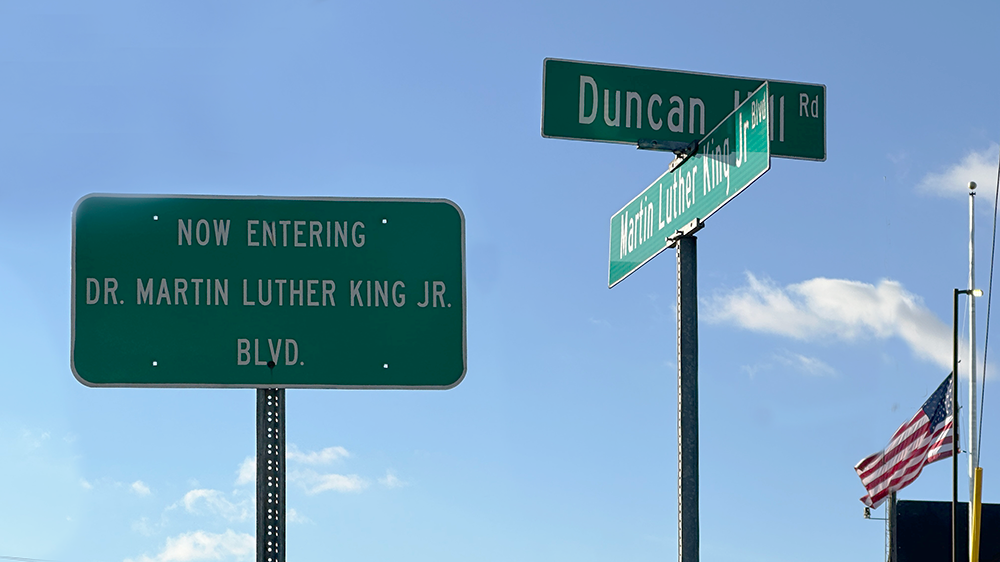Across the United States, the Rev. Dr. Martin Luther King Jr.’s name graces more than 900 streets—a testament to his enduring impact.
These signs are far more than markers of physical space. They serve as reminders of his unshakable pursuit of justice, his call for nonviolence, and his dream of a world where equality is not an aspiration, but a reality.
They also represent a call to justice, courage, and love in action. They remind us that Dr. King’s vision was never meant to be confined to history or celebrated only in symbols.
That is the enduring presence of his legacy in our everyday lives, demanding that we address the moral and systemic issues that persist today with urgency and resolve.
Street Signs Are Not Enough
Honoring Dr. King requires more than monuments, holidays, or street signs. While these symbols are important, they fall short of carrying forward the power of his vision. For Dr. King’s dream to endure, it must be lived out in our actions, in our communities, and in how we confront the profound injustices of our time. His vision was not about temporary recognition—it was about permanent transformation.
Dr. King once said, “The arc of the moral universe is long, but it bends toward justice.”
We cannot forget that this bending does not happen passively. Justice does not arrive simply because time passes, or because we believe in its inevitability. It happens because people make it happen. It happens because courageous individuals are willing to stand in the breach, confront systems of injustice, and demand dignity and equality for all people.
Justice Is Interconnected—So Are the Problems We Face
Dr. King warned us that injustice is not isolated, but interconnected.
Indeed, he was assassinated while supporting Black sanitation workers on strike for a union, better wages, and safer working conditions in Memphis, Tennessee.
The struggle for racial equality cannot be separated from the fight for economic justice. The pursuit of freedom is hollow without love and nonviolence. Today, we see these truths reflected in our world: systemic racism cannot be untangled from the racial wealth gap, environmental injustices disproportionately impact communities of color, and inequality persists across healthcare, housing, and education.
We cannot cherry-pick which issues we confront. If we are serious about honoring Dr. King’s dream, we must recognize that justice for one group is inseparably tied to justice for all. The flourishing of humanity requires dismantling the systems that dehumanize and oppress anyone—anywhere.
The Courage to Confront Hard Truths
As we walk down streets that bear Dr. King’s name, we must ask ourselves difficult questions: Are we willing to confront the uncomfortable truths about injustice in our own communities? Are we willing to acknowledge how systems of privilege benefit some while oppressing others? Are we willing to move beyond political division into recognition of the shared humanity of those who are marginalized, and into personal action to build the kind of world Dr. King dreamed of?
Honoring Dr. King means acting with the kind of courage that refuses to settle for the way things are. It means challenging ourselves to see beyond partisan battles to the underlying issues of racism, inequality, and moral decay that must be addressed if we are ever to create a world of true justice and peace.
Love Is the Hardest—and Most Necessary—Path
Perhaps Dr. King’s greatest challenge to us is his insistence on love. Not love as a sentiment, but love as a moral force—unwavering, sacrificial, and transformative. In his words: “Hate cannot drive out hate; only love can do that.” This kind of love is not easy. It requires listening to those we disagree with, forgiving those who wrong us, and working for the liberation of others—even when it comes at great personal cost. But this is the kind of love that builds bridges, restores dignity, and creates lasting change.
Are we willing to love like this, even when it feels like the hardest path forward? Are we willing to take that journey, not because it is easy or comfortable, but because it is right?
The Work of Justice Belongs to All of Us
Dr. King’s legacy is not a passive inheritance. It is a call to action.
It is a call to see the humanity in others, even when society tries to strip it away. It is a call to speak for the voiceless, even when it costs us comfort or privilege. And it is a call to work for justice—not just for some, but for all.
In this moment, we must reject the politics of complacency and division that distract us from the real issues. Instead, we must focus on dismantling systems of oppression, advocating for those who are marginalized, and building a world rooted in equity, love, and dignity.
Carrying Dr. King’s Dream Forward
This MLK Day, let’s commit to carrying Dr. King’s dream beyond the signs that bear his name, taking it into our policies, our communities, and our daily lives. The moral arc of the universe does not bend toward justice on its own—it bends because people like you and me make it bend.
The work of building a just and morally strong world cannot wait. Dr. King’s dream is not some far-off ideal. It is a vision waiting to be realized, and it depends on all of us to make it a reality.
We must honor Dr. King not just in remembrance, but in action. Today I ask you to join me in moving beyond words and into the difficult, sacred work of creating a world where every human being is valued, cherished, and free.


Comments are closed